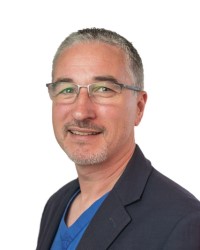Profile
Dr Mark Scott, PhD is a Principal Investigator within the Blizard Institute at Queen Mary University of London, and has led pioneering research into the underlying causes of bowel dysfunction. He is also Director and one of the founders of the internationally-renowned GI Physiology Unit (Colorec-tal service) at Barts and The London School of Medicine and Dentistry / Barts Health NHS Trust. Ap-proximately 500 patients undergo diagnostic investigations within the Unit each year, which pro-vides the resources for allied research. Further, he played a central role in the inauguration of the Neurogastroenterology Group at Queen Mary University of London.
Mark has over 30 years’ experience, both clinical and academic, related to the physiological as-sessment of functional colorectal disorders (primarily constipation and faecal incontinence). Clini-cally, Mark is proficient at undertaking all routine and specialist diagnostic investigations of colorec-tal function and structure. Academically, Mark is the UK’s most widely published colorectal GI Phys-iologist, having authored 205 original articles and 14 book chapters. He has been Guest Editor of 3 journal supplements devoted to the subject of chronic constipation, and was recently one of the European Society of Neurogastroenterology and Motility Working Team members setting guidelines for the management of constipation. Mark is currently one of the Leads of the International Ano-rectal Physiology Working Group into standardisation of diagnostic testing. He has supervised nu-merous postgraduate students (both clinical and scientific) to successful completion of their higher degrees ( PhD, MD[Res], MSc).
Research
Research Interests:
Research interests are focused on pathophysiology and treatment, including:
- visceral hyposensitivity
- assessment of colonic motor function
- development of novel investigative technologies (including ingestible telemetric devices, and high-resolution manometry)
- evaluation of novel therapies for both constipation and incontinence.
Publications
Key Publications
- Carrington EV, Heinrich H, Knowles CH, Fox M, Rao S, Altomare DF, Bharucha AE, Burgell R, Chey WD, Chiarioni G, Dinning P, Emmanuel A, Farouk R, Felt-Bersma RJ, Jung KW, Lembo A, Malcolm A, Mittal R, Mion F, Myung SJ, O’Connell PR, Pehl C, Remes-Troche JM, Reveille RM, Vaizey CJ, Vitton V, Whitehead WE, Wong RK, Scott SM, for the International Anorectal Physiology Working Group. The International Anorectal Physiology Working Group (IAPWG) recommendations: standardized testing protocol and the London classification for disorders of anorectal function. Neurogastroen-terol Motil 2020; 32: e13679
- Vollebregt PF, Wiklendt L, Dinning PG, Knowles CH, Scott SM. Coexistent faecal incontinence and constipation: a cross-sectional study of 4,027 adults undergoing specialist assessment. Lancet EClin-icalMedicine 2020; 27: 100572
- Scott SM, Simrén M, Farmer AD, Dinning PG, Carrington EV, Benninga MA, Burgell RE, Dimidi E, Fikree A, Ford AC, Fox M, Hoad CL, Knowles CH, Krogh K, Nugent K, Remes-Troche JM, Whelan K, Corsetti M. Chronic constipation in adults: contemporary perspectives and clinical challenges. 1: epidemiology, diagnosis, clinical associations, pathophysiology and investigation. Neurogastroen-terol Motil 2021: 33: e14050
- Heitmann PT, Vollebregt PF, Knowles CH, Lunniss PJ, Dinning PG, Scott SM. Understanding the phys-iology of human defaecation and disorders of continence and evacuation. Nat Rev Gastroenterol Hepatol 2021; 18: 751-69
- Bharucha AE, Knowles CH, Mack I, Malcolm A, Oblizajek N, Rao S, Scott SM, Shin A, Enck P. Faecal incontinence in adults. Nat Rev Dis Primers 2022; 8: 53.
Link to QMUL publications page
http://www.researchpublications.qmul.ac.uk/publications/staff/23125.html
